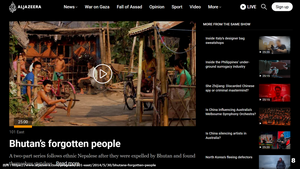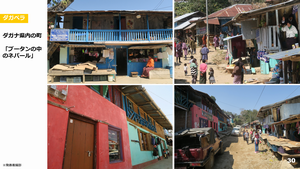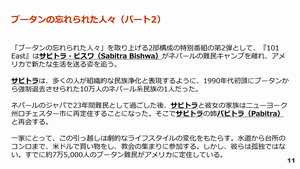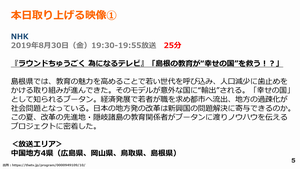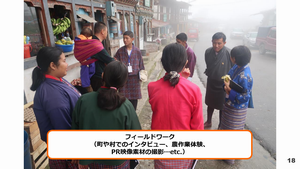- Global Collaboration Center
- Activity
- Report on the Bhutan Seminar Series 2024 (Dec.2024 & Jan.2025)
ページの本文です。
Report on the Bhutan Seminar Series 2024 (Dec.2024 & Jan.2025)
2025年2月4日更新
Beginning in FY2021, the Global Collaboration Center is hosting regional research-based seminars to (1) learn about the Kingdom of Bhutan, which is located in South Asia, and (2) examine development policies and the situation of the country and region in light of these issues. Each seminar includes a film screening, a brief commentary by the presenter, and a question-and-answer session. A total of 15 sessions are scheduled for FY2024.
11th Seminar in the Bhutan Seminar Series 2024 (2023.12.13)
The 11th seminar in FY2024 was held on Friday, December 13th. This was the 56th overall seminar, and featured Al Jazeera news and documentary programs to explore the refugee problem in Bhutan that arose in the 1990s. To enhance understanding of the content, commentator gave an explanation of the background to the refugee problem before watching the video. In the commentary after watching the video, the scenery of the southern region of Bhutan where many refugees occurred, and related papers/documents were introduced, as well as the history of Nepalese residents’ migration to Bhutan, changes in the nationality law, and the national integration policy of the 1980s.
About 30 people attended this seminar. Here are some of the participants’ comments: “I became more interested in Bhutan knowing that it is a country with such a negative history.” “Through the introduction of the video, commentator’s explanation of the background information, and watching the video, I was able to deepen my understanding of Bhutan’s refugee problem, which has not received much attention until now. I particularly learned about the religion, topography, and ethnic background of southern Bhutan through the photos.” “I was surprised to learn that there is a refugee problem in the midst of the promotion of ‘nation building in Bhutan based on Gross National Happiness (GNH)’ (I learned this for the first time at this seminar).” “I felt that there were similarities with the Rohingya problem in Myanmar and the Tamil problem in Sri Lanka. I took it to be a problem of land settlement before the concepts of nation-states and borders were imported, or simply a problem of the behavior of a ruling group against a minority group. Furthermore, I am very interested in how the fertile land of the south will be positioned within the country.”
12th Seminar in the Bhutan Seminar Series 2024 (2024.12.27)
The 12th seminar in FY2024 was held on Friday, December 27th. In this 12th seminar (the 57th overall), we continued our coverage of the Al Jazeera news footage and documentary programs featured in the previous seminar, which explored the refugee problem in Bhutan that arose in the 1990s. In the commentary session, the commentator reviewed the contents of the previous seminar, the background of the refugee outbreak in Bhutan, the anti-regime protests and movements in the southern region in 1990, the situation in refugee camps in eastern Nepal, and the efforts toward resettlement in a third country.
About 50 people attended this seminar. Here are some of the participants’ comments: “As this was the second seminar on the same topic following the last one, I was able to learn more in depth about the content of the video, the background to the emergence of refugees and third-country resettlement, etc. It was an opportunity to understand from multiple perspectives, such as the economic aspects of American society’s use of Nepalese-Bhutanese refugees as labor, the challenges facing social integration including cultural adaptation and depression among Nepalese refugees themselves and the mutual aid and cultural identity of the Nepalese community.” “Refugees are a relatively untouchable topic in Bhutan, so it was good to learn about the historical background.” “It made me realize that even in Bhutan, which has a strong image of being a happy country, there are people who are persecuted because of religious and cultural differences, and the reality is that there is a refugee problem.”
13th Seminar in the Bhutan Seminar Series 2024 (2025.1.17)
The 13th seminar in FY2024 was held on Friday, January 17th 2025. This time, a TV program was featured, on a project-based learning (PBL) workshop that took place at Chukha Central School at the end of July 2019. This workshop project was selected by the EDU-Port Japan (initiative to proactively introduce Japanese-style education overseas by providing a platform which is organized by MEXT), and was later handed over to the JICA partnership program implemented by Ama town in Shimane prefecture. In the question-and-answer session after the video, participants asked questions about the content and operation of both the PBL workshop and the JICA partnership program, which were answered by Mr. Yasuaki Yamano, director of the JICA partnership program by Ama town.
About 40 people attended this seminar. Here are some of the participants’ comments: “I learned a lot about the exchange with high school students from Shimane.” “I got a glimpse of how the Kingdom of Bhutan, a country of happiness, is tackling regional depopulation. It was good to learn about the efforts being made by Oki-Dozen Senior High School.” “It was impressive to see how the Japanese and Bhutanese students were learning from each other how to find the charms of a region, how teachers can support them, etc.” “We were able to draw out the teachers’ true feelings about their teaching methods. I am pleased that we were able to support the value of education through JICA’s grassroots cooperation. I hope that this will not end up being a passing fad, but will continue in some form. This is something I feel strongly about based on my experience of being involved in educational support in other countries.”





